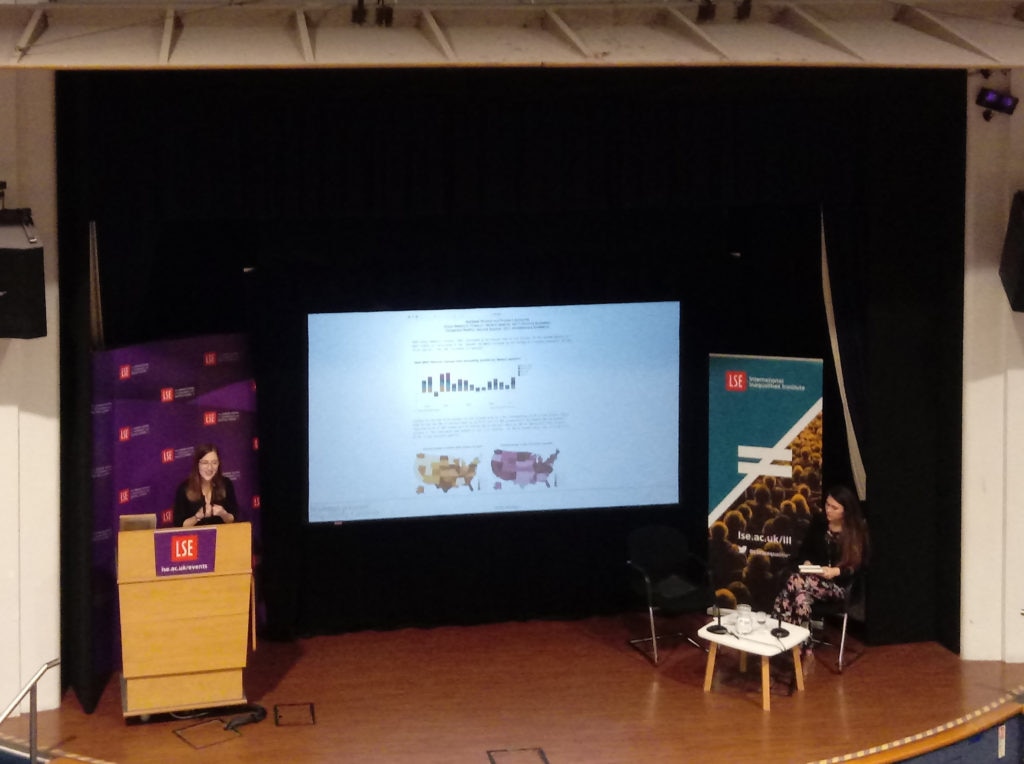Ataul Fatir Tahir, Al Hakam Correspondent

The London School of Economics University (LSE) held a talk about how widespread inequality squeezes the neck of our economy on 8 November 2019.
The speaker was Heather Bouhsey from Washington, President of the Washington Centre for equitable growth and one of Washington’s most influential economic voices. The evening was chaired by Dr Tahnee Ooma, a researcher at the International Inequalities Institute.
The talk was entitled, “Unbound: How inequality constricts our economy and what we can do about it” and took place in the LSE Old Building. The evening showed how rising inequality has become a drag on growth and an inhibition to the competitive US market.
Heather, from the outset, pointed out that “there is research evidence” for the negative effects of inequality on the economy. She explained how empirical evidence has been found on the subject due to the wealth of research carried out around the world by scholars, with a total of 5.5 million dollars being spent on research into the subject she said. The researcher also pointed out that her presentation would focus on the economy in the USA.
Through a series of research charts, Heather showed that through the 1960s/70s, average growth used to be a good proxy for Americans and when Growth Domestic Product (GDP) rose, so did income rise. The increase in wealth for most people was about 1.7% and people at the bottom of the ladder grew faster compared to their wealthier counterparts at the top.
However, since the 80s, there have been drastic changes in the economy. Firstly, from 1980 to 2016 the national income growth has slowed to 1.3% in the USA. With this, only the top 10 percent has seen above average income growth; the poor are becoming poorer and the rich are getting richer. Heather said that “a rising tide lifts all boats” was true when JF Kennedy said it, but that “is not true now”.
She also pointed out that mobility has reduced – this is the probability that children will grow wealthier than their parents. For example, if someone was born in 1940 in USA, they would have a 90% probability to “out earn” their parents. If born in the 1980s, this would reduce to only half a chance. Referring to these statistics, Heather said that “parents are no longer seeing their children do better than they did” and “at the same time, we are seeing a massive rise in wealth concentration”.
Further, according to Federal Reserve data, the bottom half has seen no rise in wealth since the 1980s while the top 1% of the affluent recovered very quickly from the Great Recession.
“We’ve also seen a rising concentration of firms” Heather said. When analysing inequality, one needs to look at income, wealth and markets.
One interesting predictor for future inequality was birth weight, which directly affects employment. Research shows that children with poorer air quality are born with lower birth weights.
“The Lost Einsteins” research was also referred to. This was research carried out by a Stanford professor, Raj Chetty showing that there were lots of children who could become innovators, scientists and entrepreneurs (Einsteins) but somewhere along the way, economic inequality and social inequality stops them being innovators. Children from highest income families are four times more likey to get a patent in innovation than those children with parents who earned less, even though the children may have scored the same in education.
Investment is crucial for the growth of our economy and wealth distribution. However, positive investment that the public wants has lowered since 1947. This is due to lack of money because the government is cutting taxes on those on the higher end of the income spectrum, especially corporate companies. Research shows those policies that are favoured for the top elite are the only ones getting passed. This is a subversion that is affecting economic outcomes as investments are not being made at a state level, Heather explained. She further said, “Fewer corporations are being fined for antitrust violations.”
The long-term decline in net investment in the USA is due to the rise in market concentration. Large corporate companies eat up competitors. Therefore, there is a lack of investment and flow of money within US society today. For example, Amazon can buy up competitors and lower prices and drive those competitors out. They can undermine product markets and take control. This will not be beneficial for buyers, consumers or society; taking control of the whole market is not a good thing, Heather noted.
Talking about solutions, Heather said, “One idea that is super easy, that we can do right now” is “to rethink how we think about economic progress.” GDP is used to measure economic progress across countries. It is an indicator that tells us something about economic progress, but it actually “no longer means anything, for at least USA”, she expressed. Today, an increase in GDP does not necessarily mean an income increase for most Americans.
“We need to start changing how we measure economic progress” she said. A plan is also in place to pilot this idea in 2020. When thinking about economic progress, we need a more inclusive measure and see how everyone across a country is doing, Heather said.
The evening ended with questions and answers with Heather Bouhsey.

